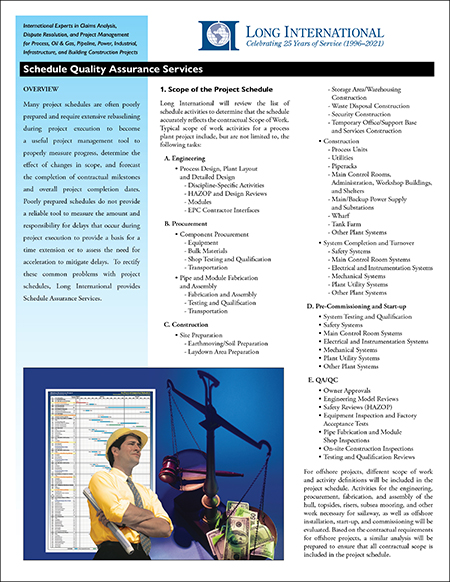
Services
Schedule Quality Assurance Reviews
Poorly prepared schedules do not provide reliable tools to quantify and allocate responsibility for delays to provide a basis for a time extension or to assess the need for acceleration to mitigate delays. We provide construction schedule quality assurance review services to correct common problems with project schedules.
A Summary of Our Typical Review Approach
Many project schedules are often poorly prepared and require extensive rebaselining during project execution to become useful project management tools to properly measure progress, determine the effect of changes in scope, and forecast the completion of contractual milestones and overall project completion dates. We perform schedule quality assurance reviews to identify and correct any issues.
1. Scope of the Project Schedule
We will review the list of scheduled activities to determine that the schedule accurately reflects the contractual scope of work. The typical scope of work activities for a process plant project include detailed tasks performed in the following areas:
- Engineering
- Procurement
- Construction
- Pre-Commissioning and Start-up
- Quality Assurance and Quality Control
2. Schedule Metrics Comparison
We will evaluate the project schedule metrics and provide an analysis of whether the schedule integrity is within standard industry practice. In addition, we will identify and list the specific activities that may require action by the owner or contractor.
3. Schedule Logic Review
We will review the construction schedule to answer questions such as:
- Do all activities have at least one successor and at least one predecessor?
- Have activities with an unreasonably large amount of float been investigated to determine if the float is justified? (It could be an indicator that activities are not properly linked in the schedule.)
- Have activity relationship gaps or overlaps been included for appropriate activities, and are the assumptions well defined for these logic gaps or overlaps?
- When a scope change occurs, especially on the critical path, and the scope change activities are entered into the schedule, does the changed scope automatically update the schedule completion date and other contractual milestones through the logic dependencies?
- Do constrained dates exist in the schedule, such as “start no later than” or “must finish on” constraints, and has the reasoning for these constraints been examined and justified?
- Was the engineering percentage completion and material received at the time of start of field construction or major fabrication checked to be sure that the progress is consistent with the contract basis for progress measurement?
- Do any activities have a large negative or positive lag in the relationships? Activities with large positive and negative lags should be identified, as they can distort the logic. Can positive lags be better represented by adding new activities?
- Do any activities have progress but no actual start date?
- Are any activities completed without an actual finish date?
- Are there any logic structures in the schedule that may lead to potential claims?
- Is the schedule calculated based on “Retained Logic” or “Progress Override?”
4. Critical Path Evaluation
We will review the reasonableness and completeness of the critical path for the engineering, procurement, construction, and pre‑commissioning activities, and any available near-critical path activity chains. Where potential vulnerabilities to the critical path are identified, we will make recommendations to mitigate the delays.
The critical path can be influenced by preferential logic, work activity estimated durations, and calculation methods used by the CPM software. We will determine if there is any evidence that preferential logic was utilized to force the critical path. In addition, we will determine if activity durations are consistent when compared to similar activities.
There are numerous side paths for subordinate tasks that normally can be performed without affecting the critical path. However, these subordinate tasks, if improperly scheduled or unduly delayed in performance, can become critical and thus change the critical path for the entire project. We will evaluate potential problems with side paths. We will evaluate near-critical paths and identify activities that are likely to impact contractual milestones and the project completion date but have not been identified as being on the critical path. These identified activities will be placed on a watch list for evaluation on future schedule updates.
Long International will also identify activity chains where owner approval or review is required, thus providing the owner with awareness when its timely performance is essential to not delay the contractor’s work or the project.
5. Schedule Comparisons
We will compare schedule updates to the baseline/rebaseline schedule or to previous schedule updates to identify changes made to the current schedule. Quality assurance reviews include the following:
- Added and Deleted Activities
- Activity Start and Finish Delays
- Activity Duration Changes
- Changes to the Critical/Near-Critical Paths
- Significant Changes to the Schedule Logic
- Added Constraints
- Changes in Schedule Calculations
- Changed Activity Coding
- Added or Changed Resources
- Identify Comments Entered into the Schedule Log Field
- Changed Scope Activities Added to the Schedule
6. Deliverables
For each of the aforementioned analyses, Long International will prepare a narrative report along with tables and exhibits detailing the information analyzed for each construction schedule review. In addition, we will export the schedule data into an Excel spreadsheet for the client’s review. If requested, we will also meet with the client’s project management and project controls personnel to review the results of the analyses.

Schedule Delay Analysis Experts
Our contemporaneous and retrospective schedule delay analyses typically focus on comparing as-planned, updated, and as‑built project schedules to identify and quantify delays to a project’s critical and near-critical paths.


